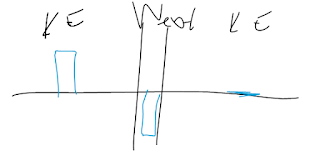Folks, I'm already teaching several AP summer institutes - see the left-hand sidebar for details. But what if you are looking for physics professional development that is NOT aimed at college-level physics? I mean, I meet so many of you each year who teach on-level, honors, college-prep, Regents... to all ages, to all varieties of student. And in my personal mission to spread physics knowledge to as wide an audience as possible, these sub-college courses represent a critical first point of contact with our discipline. I focus as much energy on my conceptual course as on my AP course each year. So I'd like to focus some of my summer professional development expertise on those who teach these first-level courses.
I'm offering a two-day institute on July 24-25, or July 31-Aug 1. These will be online, broadcasting via Zoom from my lab. Skip past the institute description for fees and registration instructions. Each weekend will be limited to the first 30 who sign up. The daily agenda is included here at the bottom of the page.
Jacobs Physics
Conceptual Physics Institute Description
July 24-25 2021 or July 31-Aug 1 2021
All levels of high school physics can be taught conceptually – where verbal and experimental reasoning is prioritized over mathematical problem solving. While mathematics are used extensively, they are used as a tool to create predictions about the workings of the natural world. Whether you teach “general”, “on-level”, “honors”, “Regents”, or “college-prep” physics, a conceptual approach can be adapted to most any introductory physics topic – and to most any state or district standards.
In our institute, we will discuss, practice, and share methods of teaching common physics content in a conceptual style. I will be broadcasting from my laboratory via zoom. Time will be devoted to experimental methods that are especially useful at the sub-college level; to course planning on a year-long and a unit basis; and to best-practices physics pedagogy, which differs substantially from pedagogy in other disciplines.
Participants will be given a full-year’s set of classroom-ready materials, including fact sheets, in-class and laboratory activities, assessments, and planning documents. More importantly, through their interactions with the instructor and with their colleagues, participants will develop skills and ideas for adapting these materials to their specific classroom environment. Those attending will also earn a certificate indicating their participation in 15 hours of physics professional development.
How much does it cost: $200 for the weekend. The schedule of events is listed below.
(1) Click the "donate" button below (or in the left column of the blog). It will take you to paypal.
(2) Enter $200.00 as the donation amount, either through paypal or credit card
(3) Click "Add special instructions to seller" or "Add a note"
(4) In the note, please include your name, preferred contact email, and institution
(5) Fill in payment info and click "donate now"
That's all - I'll be back to you within a day or two confirming your registration, and sending you links to the classroom-ready materials.
Cancelation issues: If you register then can't attend, contact me via email. As long as I can replace your spot, I'll send a full refund; if I can't replace your spot, I'll refund all but $25.
Schedule: Each session will include both whole-group presentation/discussion, and breakout groups for activities. In between sessions and during breaks, Greg will be available for informal conversation.
Saturday 24 July or 31 July (all times eastern time)
10:00 Introductions
What does “conceptual” mean – defining levels of physics
Different levels of physics: developing your program
Different levels of physics: developing your resources
11:30 Eight styles of physics laboratory activities
Including the two best-adapted for conceptual physics
My first day activity – reflection experiment
My first group laboratory experiment – refraction
1:00-1:30 break
1:30 Sequencing your course
Starting the year right: the most important physics teaching skill
Justifying answers with facts
Simple ray diagrams for optics in conceptual physics
Justifying answers with equations
In-class laboratory exercises: circuits
3:00 The daily “quiz”
Tests and quizzes, targeted to different levels
Other sorts of assessment
Preparing for the trimester/semester exam
Adapting a conceptual course to external standards
In-class laboratory exercises: motion graphs
Afternoon – asynchronous
Read through the shared files
Read through the Jacobs Physics blog
Adapt to your district or state standards
Bring questions and ideas for the social or for Sunday
7:30 Optional Zoom social: Dinner, dessert, drinks, and conversation. BYOB, obviously.
Sunday 25 July or 1 August
10:00 Building and creating experiments with whatever you’ve got
Developing your own in-class lab exercises
Using or substituting inexpensive equipment
In-class laboratory exercises: direction of force and motion
11:30 Methods to speed your grading
In-class laboratory exercises: forces in 2-d
In-class laboratory exercises: motion in 2-d
1:00-1:30 break
1:30 The final third of the year – once skills are built
How I teach impulse/momentum
Energy bar charts at the conceptual level
Laboratory exercises with harmonic motion
3:00 Sharing: Any Other Demos
Online simulations:
The Physics Classroom
The Physics Aviary
Vernier’s Pivot Interactives
Ending the year: the Physics Fight





